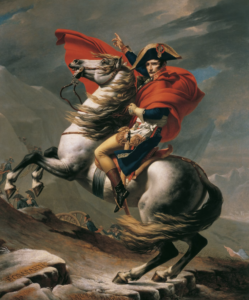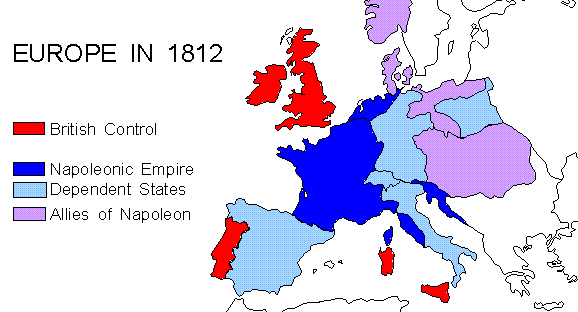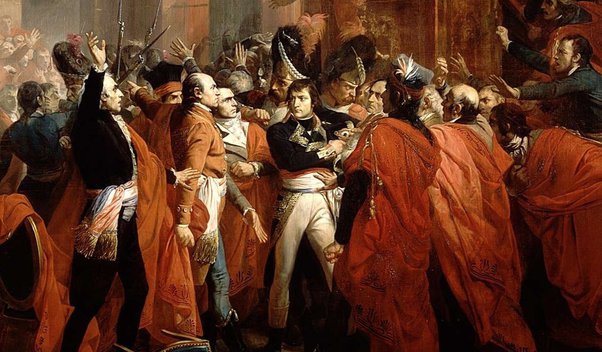Napoleon Bonaparte was a prominent European leader known for his military dominance, uniqe leadership skills, and political ambition. He rose to power in the late 18th and early 19th centuries and his reign had a great impact on France and Europe’s History.
Rise of Napoleon:
Born on the island of Corsica on August 15, 1769, Napoleon Bonaparte, also known as Napoleon I was an ambitious young man who received education at a military school in France. He spent a lot of time alone with books because he was bullied by his peers, resulting in him becoming knowledgeable in subjects like geography and history [1]. He graduated in 1785 and began his military career fighting on the side of Italy during the Pasque Paoli revolution [2] as a second lieutenant at 16.

He quickly rose through the ranks and, by the time of the French Revolution in 1789, became a respected military commander. During the Revolution, Napoleon served as a general in the French military campaigns at the age of 24, which helped him gain popularity and support.
Napoleon’s military campaigns in Italy and Egypt earned him widespread recognition and popularity. While Napoleon led the French army to victory in Italy, he led a disastrous campaign in Egypt in the Battle of the Nile. His setback in Egypt was caused by the successful blockade by the British navy, which prevented him from receiving supplies and reinforcements.
Despite this defeat, Napoleon’s reputation as a skilled military leader grew, eventually propelling him to power as Emperor of France. However, controversy still existed as he was accused of looting Italy and engaging in other questionable actions. These accusations were proven to be true to some extent. However, many still admired Napoleon for his military prowess and ability to stabilize France after years of Revolution and chaos.
Finally, In 1799, In a coup d’état (a small group’s sudden, violent overthrow of an established government), he deposed the existing French government and established himself as First Consul. Over the next few years, he used his power to institute several reforms and modernize the French state. He declared himself Emperor of France and was crowned in 1804.
As France’s leader, Napoleon launched a series of military campaigns known as the Napoleonic Wars (1800-1815). These wars were fought between Napoleonic France and other European powers.
One of his earliest campaigns was in 1802 when he sent an army to re-establish control over Saint Domingue, the most valuable of France’s colonies in the West Indies [3]. From then, Napoleon lead successful wars against various European alliances, including the major powers of the time, Austria, Prussia, and Russia. In 1805, Napoleon defeated the combined armies of Russia and Austria at the Battle of Austerlitz, establishing France as the dominant authority in Europe.
The following year, he founded the Rhine Confederation, a group of German states allied with France. The Napoleonic Wars greatly expanded the French Empire from Spain to Russia, reshaping Europe’s political landscape.
 [8]
[8]
Modernizing France:
Napoleon was known as a masterful strategist due to his unique ideas and ability to quickly to changing situations on the battlefield. He would often use deception, diversionary tactics, and surprise attacks to gain the upper hand.
Napoleon is also credited developing modern warfare. He introduced several modern military tactics:
- Using artillery and mobile artillery units
- Created the concept of mass infantry attacks
- Created elite units (Imperial Guard; The imperial guard is known for their exceptional discipline and loyalty to Napoleon, and they were often used as a terrifying force on the battlefield. )
He also revolutionized logistics, introducing standardized supply chains and improving transportation systems to support his armies in the field. These improvements allowed him to keep his troops fed, equipped, and healthy, giving him an advantage over his opponents. Napoleon was also known for respecting his troops, making sure to constantly motivate them, as they were a crucial part in winning battles.
Apart from his success on the battlefield, Napoleon implemented numerous reforms in law, education, and government administration which modernized France.
Law:
He reformed French law by writing a new civil code based on Roman law. In 1804 he introduced the Napoleonic Code, which established a new legal framework. This comprehensive set of laws replaced France’s haphazard legal system before the Revolution. The Napoleonic Code was founded on the principles of equality before the law, individual protection rights, and fair property rights [4]. It also abolished feudalism and established a merit-based system of judicial appointment. The code had such an impact that it became the foundation for legal systems in many other countries. These countries include; Belgium, Italy, Germany, Spain, Portugal, and parts of Latin America. The Napoleonic Code also influenced the development of civil law in countries such as Japan and Egypt.
Education:
Napoleon established a public education system to provide basic education to all citizens, regardless of social class. He established a network of primary and secondary schools (lycée) which would not be controlled by the Church[5]. He also introduced universities that provided a comprehensive curriculum that included mathematics, science, history, and literature. The system also emphasized the importance of physical education and character development.
Government administration:
Napoleon centralized power in France and established a highly efficient bureaucracy capable of quickly and effectively implementing his policies. He reorganized the government into ministries in charge of specific policy areas such as finance, justice, and war. He also established a system of prefects, which the central government appointed to oversee local government administration.
Napoleon’s reforms had a long-lasting impact on France and laid the base for a modern state. His legacy can be found in many countries legal systems, educational institutions, and administrative structures.
Fall of Napoleon:
Napoleon’s ambition led to his demise in the end.
The Russian Campaign of 1812 was Napoleon’s first major military defeat after the Russian army refused to engage with Napoleon’s Grande Armée. The French army lost over 500,000 soldiers during the campaign. This invasion is considered one of the most lethal military operations because of the; harsh winter conditions, lack of supplies, and guerrilla warfare tactics used by the Russian army.
The campaign weakened Napoleon’s hold on power, resulting in the loss of many of his key allies. Other European powers, sensing this, declared war on France, resulting in another defeat at the Battle of Leipzig in 1813. Napoleon refused to surrender despite mounting losses and a string of defeats and continued to fight.
Two years later, in 1814, he was ultimately compelled to leave office and was exiled to the island of Elba. In 1815, he escaped from Elba and returned to France, and attempted to regain power. He briefly returned to Paris in a period known as the “Hundred Days” and regained control and reclaimed his emperor title [6]. However, he was once defeated again at the Battle of Waterloo in June 1815, ending Napoleon’s reign and the collapse of the French Empire.
Napoleon was again exiled after this defeat to the barren South Atlantic island of Saint Helena, where he spent the remainder of his life in captivity. Life in Saint Helena was difficult for Napoleon, as he was confined to a small house and subject to strict surveillance [7]. He made many attempts to escape but was unsuccessful and eventually passed away at 51 in 1821.
Napoleon’s rise and fall is both a triumph and a tragedy.
Despite Napoleon’s death, his influence on European history and legacy cannot be underestimated. Today, Napoleon is considered as one of the greatest military commanders who changed Europe’s history.
Reference:
- Team, C. (2022). Napoleon Bonaparte. [online] ClearIAS. Available at: https://www.clearias.com/napoleon-bonaparte/ [Accessed 2 Jun. 2023].
- com. (2023). Available at: https://study.com/learn/lesson/rise-fall-napoleon-bonaparte.html [Accessed 2 Jun. 2023].
- Virginia Museum of Fine Arts |. (n.d.). Napoleon’s Rise & Fall: Illustrated Timeline. [online] Available at: https://vmfa.museum/learn/resources/napoleons-rise-fall-illustrated-timeline/ [Accessed 2 Jun. 2023].
- Saylor Academy. (n.d.). Napoleon’s Government: Further Centralization Of Power. [online] Available at: https://learn.saylor.org/mod/book/view.php?id=54758&chapterid=40234#:~:text=Napoleon%20instituted%20several%20lasting%20reforms [Accessed 2 Jun. 2023].
- International School History. (n.d.). Lesson 5 – Napoleon’s Reforms. [online] Available at: https://www.internationalschoolhistory.com/lesson-5—napoleons-reforms.html [Accessed 2 Jun. 2023].
- com Editors (2009). Napoleon abdicates the throne and is exiled to Elba. [online] HISTORY. Available at: https://www.history.com/this-day-in-history/napoleon-exiled-to-elba [Accessed 2 Jun. 2023].
- Encyclopedia Britannica. (n.d.). Napoleon I – Exile on St. Helena. [online] Available at: https://www.britannica.com/biography/Napoleon-I/Exile-on-St-Helena [Accessed 2 Jun. 2023].
- google.com. (n.d.). Napoleon’s Empire Collapses – Miss Migliore’s Classroom. [online] Available at: https://sites.google.com/a/dansvillecsd.org/migliore/lessons/unit-2/napoleon-s-empire-collapses?tmpl=%2Fsystem%2Fapp%2Ftemplates%2Fprint%2F&showPrintDialog=1 [Accessed 2 Jun. 2023].


